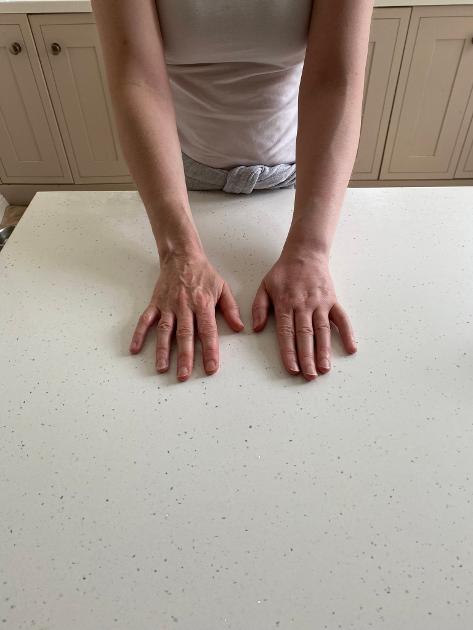hi there I am researching lva but not sure if it is worthwhile . I have le in left arm as secondary, but difference between good arm and other arm is only c.2 percent. Sadly last oct it went to my hand. I am now being told that probably I should have been weaned off compression as my swelling was so slight which is very frustrating as it is now in my hand. It is very mild in my hand but upsets me. From reading posts it seems that even If lva is deemed a success it does not remove the swelling completely and so a lot of people would probably consider my arm and hand a good post op result. In which case I would be risking that the surgery might actually increase the swelling and not improve it. Also I read a post from one of the surgeons saying thsf where swelling is less than ten percent the aim is to reduce reliance on compression or remove it altogether. Which makes me think that maybe my current situation would be considered a success and my expectations of any improvement from lva are unrealistic. Does this make sense? It is just the swelling in my hand I want to improve, the arm is fine. And since swelling went to my hand I am now not wearing compression as the glove part hurts too much and seems to make things worse. So I feel nearly afraid to move. All advice welcome and attaching a photo of hand and arm
lva is it worthwhile if swelling very mild: hi there I... - LSN
lva is it worthwhile if swelling very mild

Hi I forgot to say I got le in 2006. So I have it a long time but only in hand since last year and volume difference very small. I would so love to do it and have a successful outcome but not sure if my expectations are unrealistic and if I am risking making the swelling worse
I had an assessment at the Oxford Lymphoedema Practice in 2019 with a view to having LVA. The assessment included an ICG lymphography scan which showed my lymphatic vessels weren't of good enough quality for LVA.
The surgeon I saw at OLP said that LVA was more likely to give good results where lymphoedema is very mild. Mild swelling indicates reasonably good quality lymph vessels which will help to ensure a successful/ functional anastomosis with a blood vessel. However, I don't think there's any way of knowing for sure. A surgeon might be able to give you an idea of your likely outcome after seeing your ICG lymphography images.
I was also advised by the OLP that, of patients who are considered suitable for LVA, about 80% will realise some benefit to a greater or lesser degree.
Have you tried multi layer bandaging on your hand? A lymphoedema specialist should be able to advise about this
Thanks very much Perido. 80 percent sounds very encouraging to me from how I feel now. I have had bandaging, mld, rld, acupuncture , swimming, sea swimming, k tape you name it.
It’s a big decision of course. Surgery I guess is last resort. But 80 percent chance of an improvement does sound very good
Hi Buddywhite, a note of caution about 80% chance of improvement with LVA. Whilst you might be lucky and get a great result it's also possible thar any improvement might be very slight and might, for example, be to your arm rather than your hand.
People who get good results from LVA are far more likely to put their experience on social media than those who haven't had a good experience.
I wish you all the best with your decision making. I know how difficult it can be.
Outcomes of lymphoedema treatment of any type are difficult to assess as it depends on the area and severity of your disease at the beginning of treatment. Is it all about volume or garments or pain or progression or infection. For example if the outcome of treatment is all about volume - liposuction is the most predictable and reliable treatment for volume reduction. However, if it is all about how much you wear compression then liposuction has a 100% failure rate as 100% of people must wear it afterwards. Also if you have a 5% volume difference between your two limbs and LVA reduces that to 2.5% (ie half the volume difference) then it is a 50% reduction in the excess limb volume but not that noticeable by the patient. If you have a40% volume difference that is reduced by surgery to 20% then that is huge but you are still at 20%! If you treat a patient early with LVA then there is a reasonable chance to get a patient out of compression whilst maintaining volume.
LVA surgery is best suited to early disease. Whilst the limb volume reduction as not that dramatic as later disease, if you can reduce but most importantly stop progression to a large limb then that is a great result as you never experience the larger volume changes. One difficulty is the progression of lymphoedema is very unpredictable with some patients remaining with mild disease for many years but some progressing rapidly .
The success of any treatment depends many factors and depends how it is measured. I would say that each treatment must be bespoke for each patient and the expected / potential outcomes and goals of that treatment (surgical or non surgical) must be discussed in detail before commencing that treatment. 'Outcomes' of lymphoedema treatment is a fascinating and complex topic.
However to your original question. - LVA is best suited to early disease with some residual lymphatic function in the limb affected and aims to reduce volume, reduce compression dependence, reduce progression. Hope that is of some use.